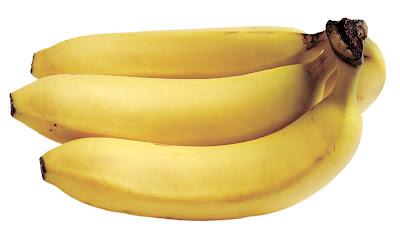American Mavericks comes to Carnegie Hall.
by Paul Pelkonen

A key component of John Cage's Song Books, and a valuable source of potassium.
(Andy Warhol was an "American maverick too!)
The stage of Carnegie Hall on Tuesday night had a poker table on it. Some microphones, two pianos, and a counter with a typewriter at one end, some fruits and vegetables, and a blender.
Three wooden Monopoly® houses stood at the back of the stage, covered with movie screens. The lighting was provided by vertical flourescent bars, mounted on poles around the stage. Two men worked a mixing board and sound station on stage left. A member of the orchestra sat and read a newspaper, tearing it into strips. (Hopefully, it wasn't the arts section.) Other musicians played cards, and later, chess.
This was the unique setting for the opening of American Mavericks, a concert series at Carnegie Hall featuring the San Francisco Symphony, and curated by their music director Michael Tilson Thomas. The SFS is celebrating its centennial in the same year that marks the 100th birthday of composer John Cage. Fittingly, the concert opened with excerpts from Mr. Cage's mammoth Song Books, a strange, occasionally frustrating work that calls for pre-planned actions, random determinations and yes, singing and accompaniment to create a complicated web of sounds and ideas.
Soloists Meredith Monk, Joan La Barbara and Jessye Norman sang while taking part in the anachronistic actions. Ms. Monk clod-hopped across the stage, singing lyric lines or simply generating noises. Ms. Norman (in her de rigeur full diva gown) sat and typed when she wasn't using her huge soprano to declaim the text. Ms. La Barbara and Mr. Tilson Thomas used a laser and a Carnegie Hall seating chart to pick out a seat. The singer then delivered a pretty, wrapped present to the ticket-holder, while the conductor filmed her with a video camera.
Members of the San Francisco Symphony and St. Lawrence String Quartet appeared on the stage. The bassoonist attempted to play his (partially deconstructed) instrument using a violin bow. Mr. Tilson Thomas chopped fruits and vegetables, preparing a smoothie with the blender. He added a banana, and tasted it again. Eventually, he added some blocks and stones to the piano, playing tonal clusters on the strings. (Later, another musician tried the smoothie.)
The music: electronic drones, low piano clusters, and parts for brass, wind and string quartet. Voices, as the three singers made some strange, beautiful sounds, declaiming texts drawn from the works of Henry David Thoreau. The cocktail of music, noises and prosaic activity drew the listener into the text, even when it was simply the name M-A-R-C-E-L D-U-C-H-A-M-P held up in front of a video camera. The bewildering, hypnotic performance was a fitting tribute to John Cage's anarchic, creative spirit.
During a long intermission, the little houses, lights, card table, and juice bar were removed for the second half of the concert. under ordinary concert lights, featuring the black-clad SFS players seated in a traditional, orchestral configuration. There was nothing "traditional" about the repertory, which was superbly played and conducted by Mr. Tilson Thomas.
The first work was Synchrony, by California composer Henry Cowell. An extended trumpet solo led off the work, providing thematic blueprints for the rest of the orchestra to follow. They played a rich collage of sounds, from fragments of traditional melodies to "tone clusters", huge slabs of sound that lack the traditional intervals which make ordinary chords pleasing to the ear.
Next up: the New York premiere of John Adams' Absolute Jest, featuring the St. Lawrence String Quartet as an antiphonal ensemble, playing concerto-like against the rest of the orchestra. In this recent work, Mr. Adams' musical focus is squarely on Beethoven, specifically that composer's late period. In fact, the taut musical fabric of Jest is woven from threads gleaned from the Ninth Symphony, the late string quartets, and the Grosse Fugue. It proved an engrossing 22 minutes, with a finale borrowed from that composer's earlier Waldstein Sonata.
The full artillery of the San Francisco Symphony Orchestra took the stage for Edgar Varèse's Amériques, a brawling work that veers between Mahlerian grandiosity and tone clusters that hang in the air like massive, floating granite blocks. The proceedings were occasionally accompanied by a wailing siren. This was not the arrival of local constabulary, but part of the performance. As Mr. Tilson Thomas brought the huge orchestra to a roaring, pounding, arrhythmic climax of ear-splitting power, the first night of American Mavericks ended in triumph.

